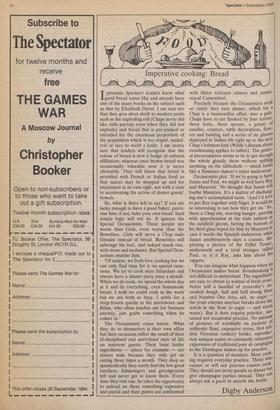-4111 4 1111 11111 1 i 1
sour
,
Imperative cooking: Bread
Ipresume Spectator readers know what .good bread tastes like and already have one of the many books on the subject such as that by Elizabeth David. I am sure too that they give short shrift to modern perils such as the exploding roll (Chaps never did like rolls anyway even when they did not explode) and bread that is pre-packed or intended for the enormous proportion of the population which is too stupid, malad- roit or lazy to wield a knife. I am nearly sure that readers will recognise that the colour of bread is now a badge of cultural affiliation; whereas once brown bread was occasionally tolerable now it is never allowable. They will know that bread is provided with French or Italian food so that sauces may be mopped up and for enjoyment in its own right, not with a view to accelerating the action of dinner guests' bowels.
So, what is there left to say? If you are lucky enough to have a good baker, patro- nise him; if not, bake your own bread. Such simple logic will not do. It ignores the Special Occasionists. These people are worse than Girls, even worse than the Bowelites. Girls will serve a Chap stale Grissini instead of bread. Bowelites will sabotage his loaf, and indeed much else, with straw and molasses. But Special Occa- sionists murder him.
'Of course, we both love cooking but we can only find time for it on special occa- sions. We try to cook most Saturdays and always have a dinner party once a month. When we do cook, we spend the whole day at it and do everything, even homemade bread. I wish we could cook in the week but we are both so busy. I settle for a deep-frozen quiche in the microwave and Brian, who often lunches out for business anyway, just grabs something when he comes in.'
The Occasionists cause havoc. What they do to themselves is their own affair but their occasions inflict the result of their ill-disciplined and uncivilised style of life on innocent guests. Their basic larder ingredients — spices for example — are always stale because they only get an outing three times a month. They shop so spasmodically they rarely find the few good butchers, fishmongers and greengrocers left and never get to know them. Every time they visit one, he takes the opportunity to unload on them something expensive and putrid and their guests are confronted
with thrice refrozen salmon and amino- niacal Camembert.
Precisely because the Occasionists cook so rarely they turn dinner, which for a Chap is a businesslike affair, into a gala. Chaps have to eat flanked by four knives, three forks, three spoons, a galaxy of candles, coasters, table decorations, flow- ers and bunting and a series of six glasses deployed in Indian file right up to the next Chap's leftmost fork (Wilde's dictum about overdressing applies to tables). The gener- al preoccupation seems to be to get through the whole ghastly show without spilling anything on the tablecloth — which looks like a flamenco dancer's outer underwear.
Occasionists plot. 'If we're going to have Susan and Paul, we might as well have RaY and Maureen.' No thought that Susan will loathe Maureen. It's a matter of discharg- ing one's accumulated turns. 'And I'd love to put Ray together with Nigel. It would be so interesting to see how they get on.' So, there a Chap sits, starving hungry, peering with apprehension at the stale salmon in the candlelit gloom, having the bottom of his third glass wiped for him by Maureen in case it marks the Spanish underwear while Susan unobtrusively slips a coaster, dis- playing a picture of the Eiffel Tower, underneath and a total stranger called Paul, or is it Ray, asks him about his tappets. You can imagine what happens when an Occasionist makes bread. Breadmaking IS not difficult to understand. The ingredients are easy to obtain (a walnut of fresh yeaSti better still a handful of yesterday's un- cooked dough, half and half strong flour and Number One Atta, salt, no sugar — the yeast enzyme amylase breaks down the starch in the flour to sugar — and warm water). But it does require practice, sus- tained not occasional practice. No amount of pictures of windmills on packets of authentic flour, expensive ovens, first edi- tion Victorian cookery books, reproduc- tion antique scales or constantly reiterated experience of traditional pain de campagne in the Dordogne makes up for practice. It is a question of manners. Most cook- ing requires everyday practice. Those wh° cannot or will not practise cannot cook. They should not invite people to dinner but give champagne parties instead. They can always ask a guest to uncork the bottle.
Digby Anderson










































 Previous page
Previous page